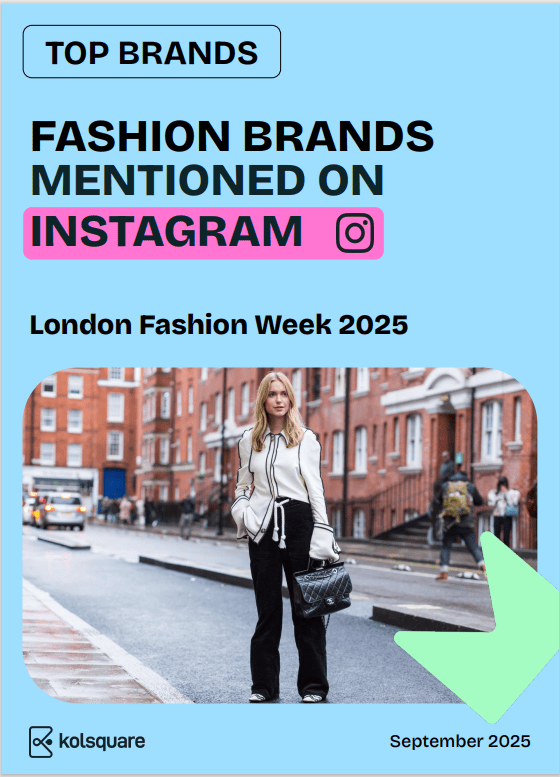Q: London Fashion Week has positioned itself as more progressive than the past with new sustainability requirements. From your perspective, is the reality living up to the rhetoric?
Brett: While London made big strides in becoming the first of the "big four" to adopt Copenhagen’s sustainability requirements for brands on schedule, we simultaneously have Vinted and eBay on the London Fashion Week schedule alongside both Zara and H&M. Are we serious about sustainability or not? How can we platform some brands, and make big requirements from emerging designers while giving space to two of the most exploitative, greenwashing brands on the planet?
Q: Despite these contradictions, do you see opportunities for London Fashion Week if the right values are prioritised?
Brett: There’s an opportunity right now, that while consumers are becoming tired of big brands and logos they can’t trust, there’s a desire for craftsmanship and sustainable fashion storytelling from honest brands with real values.
Q: Funding always seems to be a sticking point in the conversation around sustainability. What role does it play in greenwashing?
Brett: We are almost always at the mercy of big-but-bad money. At almost anything to do with sustainability, the funding sponsor is a large brand or business with problematic ties. It’s so underfunded that the money usually comes from a bigger, worse brand that is using the project to greenwash their image and act like they care.
A lot of influencer marketing is still driven by short-term sales and immediate link-to-buy performance. What alternative role do you think London Fashion Week creators should play to encourage responsible fashion campaigns?
Q: A lot of influencer marketing is still driven by short-term sales and immediate link-to-buy performance. What alternative role do you think London Fashion Week creators should play to encourage responsible fashion campaigns?
Brett: The creators’ job has been guided purely by capitalism, where their worth is only valued by how much and how quickly they can sell products. I’d like to see a shift away from this, and the link-to-buys, towards deeper storytelling, transparency and craft. Taking people away from impulse buys and towards discovery - where they can learn before they buy.
Rather than a product test or try-on, can UK fashion influencers show an audience where the product came from, who made it, and how? The influencer should foster long-term trust with their community and prioritise that relationship over short-term, trend-led exposure.
Q: If you could reimagine how fashion is funded, represented and partnered with creators, what would you push for?
Brett:
- Decentralisation of fashion in the UK, something the British Fashion Council (BFC) is doing this September.
- Invest in long-term partnerships with well-aligned London Fashion Week creators who can better communicate the brand and industry values we need.
- Be more intentional with who we choose to give brand money and association to when it comes to creators, prioritising ethical influencer partnerships.
- Challenge is not the enemy. Complacent yes-people are the enemy, who stand for nothing.
- Check who else the creators work for when you run influencer marketing fashion campaigns. Can you clearly see a strong creator-brand alignment or association with a specific type of brand? Do they care about what they do, or are they just here to sell and make money? Do they have a voice, and how do they use it?
- Using responsible UK fashion influencers who make highly produced content allows for more repurposable assets that can sit on the brand’s feed as well as the creators’.
- A key creator has consistent engagement from people who trust the creator and their work, regularly engaging in meaningful comments, rather than sharing “flame emojis”. They may also have other means of communicating with their community, such as an active broadcast channel or Substack.
Q: Andy Warhol once said, “Fashion is deeply superficial.” What does that mean in the context of 2025 and fashion influencer marketing?
Brett: Following on from the Warhol quote, algorithms, PRs and the wider industry have praised the lowest forms and most agreeable content over nuance and critical thinking. The iPhone fitpic merchants who offer little to a conversation have been notoriously over-compensated and over-indulged in the industry because they help push trend cycles the quickest. But there are creators now who offer so much more: analysis, history, challenge and honest opinions. London Fashion Week was designed for a very few select people originally: buyers and press.
With the celebrity zeitgeist and fashion creator marketing evolving, more seats became available to the press, which expanded into celebrities and influencers to obtain something called “earned media value”. This has gone so far now that the creators often don’t care about supporting the show or the designer; they just want to be seen in the front row of the hottest ticket in town. Its roles have levelled out, and rather than the designer gaining from the talent to sell clothes, the “talent” is gaining in social clout by being associated with pop culture and high fashion.
Q: How does London compare to other fashion capitals when it comes to prestige and investment?
Brett: In the other fashion capitals, fashion has an inherent value and respect from wider society. Working in fashion in Milan is heralded as one of the best industries to work in; there are jobs everywhere from luxury brands, head offices, marketing and creatives, as well as textile manufacturing and mills.
People are desperate to know who you work for and how you got there. In England, and certainly outside of London, people look down on the industry as something which is unserious, temporary and unfulfilling. The government has underfunded and underappreciated the industry's work for years, breeding challenging and problematic opinions about the industry.
When I say I work in fashion, people follow up with questions like, “Oh, in retail?”, “But what are you going to do for a career, as a real job?”, “Did anyone in fashion even go to University?”, and “Are you gay?”
They can’t fathom men working in fashion because it is notoriously a women-dominated industry. Therefore, they’ve attached a lesser importance on the industry as a whole, and assume that it’s exclusive to women and gay men, filled with low-skilled jobs, which are less serious, fun, and non-impactful.
But the reality is that fashion has employed 300 million people in recent years, and globally it contributes to a huge amount of greenhouse gas emissions (10%, the second-most-polluting industry). If we take fashion seriously, respect the highly skilled workers and realise how much it contributes to the economy, we might be more serious about tackling the negative impact of it too.
Q: From the outside, fashion weeks look like glamorous showcases. But what’s the reality behind the curtain?
Brett: Fashion week is a glossy mirage, a surface-level display of an industry that is struggling in many ways. Designers with no money miraculously pull things out of the bag to continue to subscribe to the upper echelons of the world and be in front of clients. Other brands hide their scandals by inviting massive celebrities to help rehabilitate their brand image, and behind it all is a massive cost to the planet, with more collections than ever before, extravagant locations and more and more trends, which translate to the most polluting brands at the ultra-fast fashion level.
There are fewer stories, less substance and more stuff for stuff’s sake.
Q: Finally, London has always had a reputation for boldness. How should that spirit shape its future?
Brett: When people think of British fashion, the names that come to mind are people like Vivienne Westwood and Alexander McQueen, who were bold, brave and always stood by who they really were. Unafraid to speak out and say the truth.
We have to take inspiration from them, rather than hinder or silence people who do the same as they did. Stories are important, and they move people; this is extremely valuable within the fight for a more sustainable industry and responsible fashion campaigns in London.
Closing note: brands and LFW creators must learn from famous British designers
Fashion week in the UK is at a tipping point: it can either double down on surface-level spectacle or reclaim its role as a platform for honesty, values and craft. As industry expert Staniland points out, Britain’s greatest fashion icons were truth-tellers first and designers second. The challenge now is whether the industry is willing to be just as bold.
About Kolsquare
Kolsquare is Europe’s leading Influencer Marketing platform, offering a data-driven solution that empowers brands to scale their KOL (Key Opinion Leader) marketing strategies through authentic partnerships with top creators.
Kolsquare’s advanced technology helps marketing professionals seamlessly identify the best content creators by filtering their content and audience, while also enabling them to build, manage, and optimize campaigns from start to finish. This includes measuring results and benchmarking performance against competitors.
With a thriving global community of influencer marketing experts, Kolsquare serves hundreds of customers—including Coca-Cola, Netflix, Sony Music, Publicis, Sézane, Sephora, Lush, and Hermès—by leveraging the latest Big Data, AI, and Machine Learning technologies. Our platform taps into an extensive network of KOLs with more than 5,000 followers across 180 countries on Instagram, TikTok, X (Twitter), Facebook, YouTube, and Snapchat.
As a Certified B Corporation, Kolsquare leads the way in promoting Responsible Influence, championing transparency, ethical practices, and meaningful collaborations that inspire positive change.
Since October 2024, Kolsquare has become part of the Team.Blue group, one of the largest private tech companies in Europe, and a leading digital enabler for businesses and entrepreneurs across Europe. Team.Blue brings together over 60 successful brands in web hosting, domains, e-commerce, online compliance, lead generation, application solutions, and social media.


















.webp)
